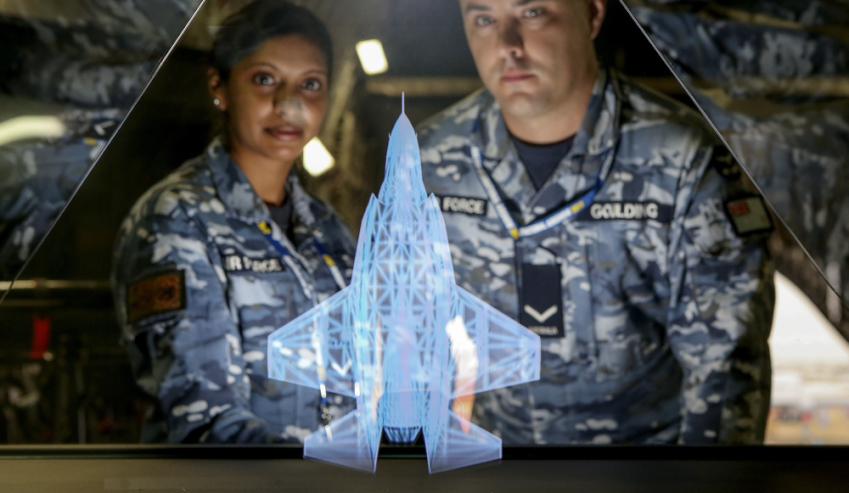The University of Sydney Nano Institute and the Royal Australian Air Force have announced the launch a scientific collaboration to provide world-leading sensing technology for Australia’s defence.
Researchers at the Jericho Smart Sensing Laboratory will develop nanoscale devices that can assess the physical, chemical, biological, acoustic or electromagnetic environment. This is vital technology for Australia in monitoring electromagnetic, space and underwater domains as they become more contested and congested.
Deputy Chief of Air Force, Air Vice-Marshal Gavin Turnbull, said, "Advanced sensors give us a clearer picture of what is happening against difficult targets in challenging environments."
Plan Jericho is the RAAF’s project to develop augmented intelligence capability to protect Australia from technologically sophisticated and rapidly changing threats. The Jericho Lab at Sydney Nano will form a critical part of the plan’s scientific infrastructure.
AVM Turnbull added, "We need to think differently to achieve and maintain our competitive edge in a rapidly changing world, and this is something we cannot do alone. Our academic and other partners are helping us to disrupt ourselves in a controlled way, which is a far better proposition than unwillingly being disrupted by our competitors."
Associate professor Cara Wrigley from the Sydney School of Architecture, Design and Planning has been appointed the Jericho chair of design innovation, responsible for bringing the University of Sydney’s research closer to real-world defence problems.
"The University of Sydney’s world-leading design methodologies partnered with Air Force’s experience will accelerate our cutting-edge photonics research into a real defence capability advantage for Australia," Wrigley explained.
The technology developed at the Jericho Smart Sensing Lab will be optimised for Australian conditions, including humidity, foliage and other environmental factors that currently pose challenges for airborne sensors.
Wrigley added, "When used on aircraft, satellites, vehicles and integrated into a sophisticated Combat Cloud – or Internet of Defence Things – these sensors will enable game-changing awareness."
Professor Duncan Ivison, deputy vice-chancellor (research) at the University of Sydney, explained, "The Jericho Smart Sensing Laboratory will see the design, development and integration of future-generation photonic sensors, to provide enhanced situational awareness for the RAAF."
The design-led collaboration brings together Wrigley and Professor Benjamin Eggleton from the School of Physics and director of Sydney Nano. The sensing chips use photons – particles of light – which cannot be affected by electromagnetic fields in the way that electronic chips can be.
"Our smart-sensing technologies are enabled by photonic platforms, which are miniaturised on to thumbnail-sized chips to bring massive reduction in size, weight and power consumption, ideally suited for mobile or aerial platforms," Professor Eggleton explained.
The experimental work will be located in the Sydney Nanoscience Hub, the headquarters of the University of Sydney Nano Institute. This purpose-built building for research and teaching incorporates state-of-the-art, environmentally controlled laboratories specifically designed for research in nanoscale devices, such as those that will underpin the compact smart sensors developed in this project.
Researchers will be able to access the 800 square metres of cleanroom space providing lithography equipment for printing photonic circuits in silicon and other materials as well as packaging and prototyping facilities.
Professor Eggleton’s research in photonic chip technology is world-leading and he regularly presents plenary talks at major scientific conferences. As well as being one of most cited researchers at the University, his group has enjoyed successful collaborations with industry and end-users for many years. He currently works with Lockheed Martin, Harris Corporation and the US Army Research Laboratory as well as DSTG in the defence sector.
His group’s leading work on photonic sensors was the basis for the NSW government asking Professor Eggleton and Professor Justin Gooding (from UNSW) to establish the NSW Smart Sensing Network, which they established in 2016.
The University of Sydney is well-positioned to engage the Air Force on this project through its multidisciplinary initiatives, including Sydney Nano. As well as providing leading-edge technology for the Air Force, the project should also lead to commercialisation opportunities and assist in the creation of sovereign capability.






